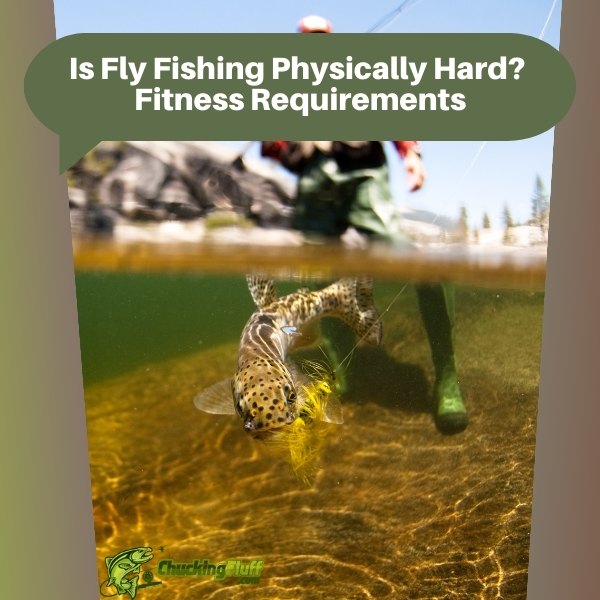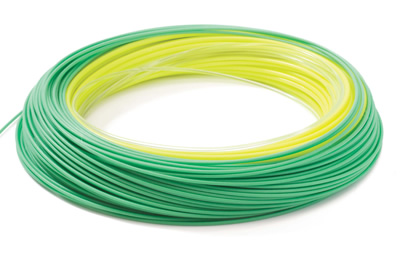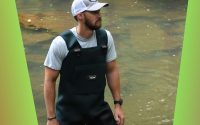| Disclosure: Just to be open and honest the buttons and links you click on in the website will in most cases take you to another website where you can purchase the products I am reviewing. As an Amazon Associate I earn from qualifying purchases. |
Is Fly Fishing Physically Hard? Fitness Requirements

Fly fishing, often perceived as a tranquil pastime, requires a surprising amount of physical effort and skill. Here’s a detailed exploration of the physical demands, skills required, equipment considerations, and health benefits associated with this popular angling method.
Quick Post Navigation
- Introduction to Fly Fishing
- Physical Demands of Fly Fishing
- Skills Required for Fly Fishing
- Equipment and Gear
- Environmental Factors
- Fitness Level and Fly Fishing
- Common Physical Challenges
- Techniques to Reduce Physical Strain
- Benefits of Fly Fishing for Physical Health
- Training and Preparation
- Safety Considerations
- Accessibility of Fly Fishing
- Expert Insights and Tips
- Conclusion
- “Check out some of our other Buying Guides”
Introduction to Fly Fishing
Fly fishing distinguishes itself from other fishing techniques by using artificial flies as lures, which are cast with a specialized fly rod and line. Originating in ancient times and gaining popularity across centuries, fly fishing is cherished for its connection to nature and the artistry involved in presenting the fly to the fish.
Physical Demands of Fly Fishing
Contrary to its serene image, fly fishing can be physically demanding. The continuous casting motion, often repeated throughout the day, requires significant upper body strength and stamina. Casting involves precise movements to mimic the natural behavior of insects on the water’s surface, demanding both skill and physical effort.
Skills Required for Fly Fishing
Mastering fly fishing requires a combination of skills. Anglers must learn various casting techniques such as overhead cast, roll cast, and double haul to effectively present the fly to fish in different water conditions. Timing, accuracy, and understanding fish behavior are crucial for success.
Equipment and Gear
Fly fishing gear is specialized and impacts the physical exertion involved. Fly rods are typically lighter and longer than conventional fishing rods, designed for casting lightweight flies. The weight of the fly line, reel, and choice of flies also influence the ease or difficulty of casting and retrieving.
Environmental Factors
Environmental conditions significantly affect the physical demands of fly fishing. Windy days can make casting challenging, requiring additional effort to maintain accuracy. Fishing in rivers or streams with uneven terrain can also test balance and endurance, especially when wading through water.
Fitness Level and Fly Fishing
While fly fishing doesn’t require elite athleticism, a moderate level of physical fitness enhances enjoyment and performance. Good cardiovascular endurance supports sustained casting sessions, while muscular strength in the arms, shoulders, and core aids in handling equipment and fighting fish.
Common Physical Challenges
Extended periods of casting can strain muscles and joints, particularly for beginners or anglers not accustomed to repetitive motions. Shoulder and elbow injuries can occur from improper casting techniques or overexertion, highlighting the importance of proper form and technique.
Techniques to Reduce Physical Strain
Adopting efficient casting techniques, maintaining proper posture, and using ergonomic gear can minimize physical strain. Anglers can improve casting efficiency by focusing on smooth movements and reducing unnecessary energy expenditure, thereby prolonging fishing stamina.
Benefits of Fly Fishing for Physical Health
Despite its physical challenges, fly fishing offers numerous health benefits. The cardiovascular workout from casting and wading in water promotes heart health and improves overall fitness levels. Being outdoors in natural settings also reduces stress, lowers blood pressure, and enhances mental well-being.
Training and Preparation
Preparing for fly fishing includes physical conditioning to build casting endurance and muscle strength. Practicing casting techniques regularly improves proficiency and reduces fatigue during fishing trips. Stretching before and after fishing sessions helps prevent muscle stiffness and injury.
Safety Considerations
Safety is paramount in fly fishing, particularly when wading in rivers or handling sharp hooks. Understanding water safety principles, wearing appropriate footwear, and using wading staffs or belts can prevent accidents and ensure a safe fishing experience.
Accessibility of Fly Fishing
Fly fishing is accessible to individuals of diverse ages and physical abilities. Adaptations such as using lighter gear, employing seated casting techniques, or fishing from accessible shorelines cater to anglers with physical limitations, promoting inclusivity in the sport.
Expert Insights and Tips
Experienced fly anglers emphasize the importance of patience, persistence, and continuous learning. Learning from mentors or guides can accelerate skill development and improve fishing efficiency. Using appropriate fly patterns and understanding local fish behavior enhance success rates.
Conclusion
In conclusion, while fly fishing offers relaxation and connection with nature, it also demands physical effort, skill development, and preparation. Understanding the physical demands, mastering casting techniques, and maintaining fitness contribute to a rewarding and enjoyable fly fishing experience.
FAQs about Fly Fishing
What fitness level is required for fly fishing?
Fly fishing can be enjoyed by individuals with varying fitness levels. Basic cardiovascular fitness and moderate strength are beneficial.
How does weather affect fly fishing?
Weather conditions such as wind and rain can impact casting accuracy and fish behavior, affecting the ease of fly fishing.
Are there age restrictions for fly fishing?
Fly fishing is suitable for all ages, with adjustments made for children and seniors to ensure safety and comfort.
Can beginners with no fishing experience try fly fishing?
Yes, beginners can learn fly fishing with proper instruction and practice. Starting with basic casting techniques is recommended.
What are the health benefits of fly fishing?
Fly fishing provides cardiovascular exercise, stress relief, and mental relaxation through immersion in nature.Meta Description
“Explore the physical demands and health benefits of fly fishing. Is fly fishing physically hard? Discover insights and tips for a rewarding angling experience.”
This detailed exploration enhances the article’s depth, providing valuable information for both beginners and seasoned anglers interested in the physical aspects of fly fishing.


